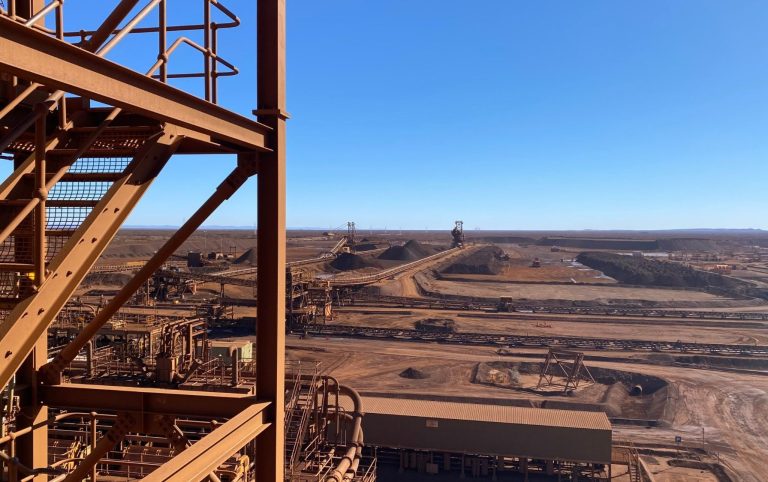The Risks and Opportunities of Diversifying Critical Raw Material Sources
Publishing Date: 18 March 2024
Author: Maria Fritsch

János Allenbach-Ammann, iron ore mine, Euractiv.com, July 12, 2023.
The European Union's supply chain vulnerability is a wake-up call we cannot ignore. The historical overreliance on one nation for critical raw materials has shown the defencelessness of the EU's global supply chains. For example, China provides 97% of the magnesium, Chile provides 97% of the lithium, South Africa provides 93% of the iridium, and Brazil provides 92% of the niobium. Concentrating sourcing in one country risks the stability of supply chains, highlighting geopolitical risks connected with dependence on a single or a few countries for critical materials needed for the EU's technological and green transitions. China's monopoly on some minerals makes achieving independence in the near term unlikely.
Thus, as raw materials often are geographically bound to specific areas, it is essential to target as many different sources as possible. China plays a critical role in every stage of the mineral supply chain, especially in smelting and refining. The country dominates nearly half of the world's refinery production. Chinese actors connect raw mineral extraction points located in the Global South and connect them with countries where industrial processing takes place. Refining minerals only sometimes occurs in the EU, resulting in its dependence on China. Furthermore, China's extensive infrastructure and strong connections with African mineral-rich countries significantly hinder truly diversifying sources. Therefore, agreements must be made with as many other countries as possible with less conflict potential.
Recognising these challenges, the European Union is diversifying its sources of critical raw materials. The Critical Raw Materials Act passed in March 2024, is significant in addressing the dependence on China. The Act sets specific goals for building domestic abilities across the raw material supply chain to diversify EU supply by 2030. It requires that at least 10% of the EU's annual consumption for extraction, 40% for processing, and 15% for recycling should come from within the Union. Additionally, up to 65% of consumption should be sourced from a third country.
On May 28, the EU and Australia signed a Memorandum of Understanding (MoU) for a bilateral partnership focused on critical minerals. This agreement diversifies the EU's supply of essential materials and supports the development of Australia's critical minerals sector. Following the MoU's signing, both parties will create a plan to implement the Strategic Partnership. The motivation for seeking a cooperation agreement with Australia is getting more powerful. With its stable government, rule of law, and shared democratic values, Australia is a reliable alternative source for raw materials. This partnership will enhance the EU's supply chain resilience and reinforce relations through economic interdependence.
However, Australia needs to strengthen its processing capabilities to effectively diversify away from China's dominance in critical raw materials, placing itself as an alternative supplier for the European Union. Although Australia is rich in vital minerals like lithium, cobalt, and nickel, more than these resources are needed according to the EU's needs for a resilient supply chain.
By investing in local processing infrastructure, Australia could offer raw materials and refined products that are ready for use in technology. Australia's aim to increase its processing capabilities is supported by potential government incentives, with tax credits for companies that establish processing facilities. These incentives aim to increase the value of critical minerals within the country. However, the current market conditions have seen some nickel projects halted due to low prices. If implemented, these tax breaks could make local processing more feasible and attract foreign investments from partners like the EU. While mineral processing in China is more advanced and cost-effective, Australia aims to decrease this gap through tax incentives and further investments.
In March, Australia strategically moved to develop a lithium processing hub in the Goldfields region, a significant step towards building domestic processing capabilities. Chris Ellison leads this initiative. It employs a 'hub and spoke' model to centralise lithium ore processing from multiple mining operations. By repurposing the Lake Johnston nickel plant to produce spodumene concentrate, Mineral Resources strengthens Australia's standing in the lithium sector. While processing into battery-grade lithium hydroxide is challenging, this supports the EU's goals of diversifying critical mineral supply chains away from China.
The European Commission has started partnerships navigated by the Action Plan on Critical Raw Materials and the Critical Raw Materials Act. Agreements were established with Canada and Ukraine in 2021, with Kazakhstan and Namibia in 2022, with Argentina, Chile, Zambia, the Democratic Republic of Congo, and Greenland in 2023, and with Rwanda, Norway, and Uzbekistan in 2024.
The reliability of supply chains is essential for the European Business Community. Thus, President Ursula von der Leyen's strategy for the European Commission aims to improve the EU's capacity for refining, processing, and recycling raw materials. Since 2011, the Commission has monitored the criticality of raw materials, releasing an updated list of EU critical raw materials every three years. The latest assessment in 2023 scrutinised 87 materials for their supply risk and significance to the EU's economy.
The failure to secure a consistent supply of these materials could drive corporations to seek more dependable foreign-sourcing regions. Therefore, diversifying supply sources for necessary raw materials is an essential strategic aim. Cooperating with states that have stable governments, the rule of law, and shared democratic values is critical to building a resilient supply chain. The diverse EU partnerships are vital for long-term resilience. It is also essential for Australia to maintain relations with China as it enhances its processing capabilities.
©Copyright. All rights reserved.
We need your consent to load the translations
We use a third-party service to translate the website content that may collect data about your activity. Please review the details in the privacy policy and accept the service to view the translations.